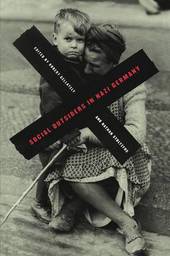
|
Social Outsiders in Nazi Germany
Paperback / softback
Main Details
| Title |
Social Outsiders in Nazi Germany
|
| Authors and Contributors |
Edited by Robert Gellately
|
|
Edited by Nathan Stoltzfus
|
| Physical Properties |
| Format:Paperback / softback | | Pages:352 | | Dimensions(mm): Height 235,Width 152 |
|
| Category/Genre | The Holocaust
Second world war |
|---|
| ISBN/Barcode |
9780691086842
|
| Classifications | Dewey:940.5318 |
|---|
| Audience | | Professional & Vocational | | Tertiary Education (US: College) | |
|---|
|
Publishing Details |
| Publisher |
Princeton University Press
|
| Imprint |
Princeton University Press
|
| Publication Date |
27 May 2001 |
| Publication Country |
United States
|
Description
When Hitler assumed power in 1933, he and other Nazis had firm ideas on what they called a racially pure "community of the people." They quickly took steps against those whom they wanted to isolate, deport, or destroy. In these essays informed by the latest research, leading scholars offer rich histories of the people branded as "social outsiders" in Nazi Germany: Communists, Jews, "Gypsies," foreign workers, prostitutes, criminals, homosexuals, and the homeless, unemployed, and chronically ill. Although many works have concentrated exclusively on the relationship between Jews and the Third Reich, this collection also includes often-overlooked victims of Nazism while reintegrating the Holocaust into its wider social context. The Nazis knew what attitudes and values they shared with many other Germans, and most of their targets were individuals and groups long regarded as outsiders, nuisances, or "problem cases." The identification, the treatment, and even the pace of their persecution of political opponents and social outsiders illustrated that the Nazis attuned their law-and-order policies to German society, history, and traditions.Hitler's personal convictions, Nazi ideology, and what he deemed to be the wishes and hopes of many people, came together in deciding where it would be politically most advantageous to begin. The first essay explores the political strategies used by the Third Reich to gain support for its ideologies and programs, and each following essay concentrates on one group of outsiders. Together the contributions debate the motivations behind the purges. For example, was the persecution of Jews the direct result of intense, widespread anti-Semitism, or was it part of a more encompassing and arbitrary persecution of "unwanted populations" that intensified with the war? The collection overall offers a nuanced portrayal of German citizens, showing that many supported the Third Reich while some tried to resist, and that the war radicalized social thinking on nearly everyone's part. In addition to the editors, the contributors are Frank Bajohr, Omer Bartov, Doris L. Bergen, Richard J. Evans, Henry Friedlander, Geoffrey J. Giles, Marion A. Kaplan, Sybil H. Milton, Alan E. Steinweis, Annette F. Timm, and Nikolaus Wachsmann.
Author Biography
Robert Gellately holds the Strassler Family Chair for the Study of Holocaust History in the Center for Holocaust Studies at Clark University. His books include Backing Hitler: Consent and Coercion in Nazi Germany and The Gestapo and German Society: Enforcing Racial Policy, 1933-1945. Nathan Stoltzfus, Associate Professor in the Department of History at Florida State University, is the author of Resistance of the Heart: Intermarriage and the Rosenstrasse Protest in Nazi Germany.
Reviews"This volume will be essential reading for scholars and students of Nazi Germany for many years to come."--Matthew Stibbe, German History
|